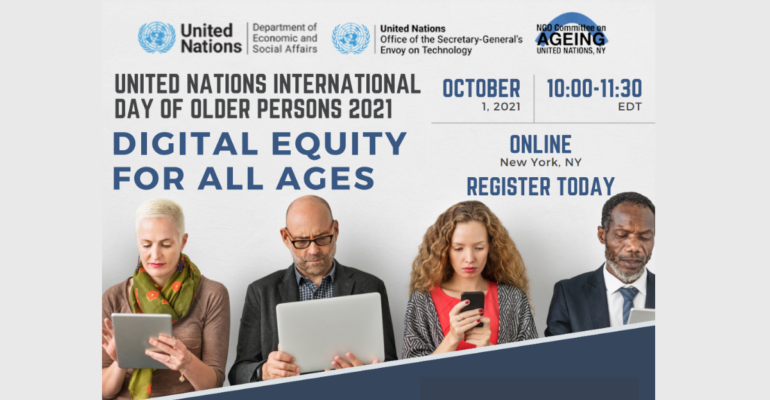Blog by Frances Zainoeddin, SI UN Representative, New York
International Day of Older Persons, observed around the world on 1 October, is usually a time to celebrate older persons, their contributions to their families, their communities and to the national economy. While many older persons lead healthy active lives, have a roof over their head and do not have to worry about their next meal, many are need of help and care. Some, especially older women, have suffered a lifetime of discrimination in terms of little education resulting in few opportunities to participate in the formal labour force, leading to few savings and assets to help them with old age. In a number of countries, women do not have property rights when their husbands die. Sadly, women are left further and further behind.
This year, on 1 October, the NGO Committee on Ageing-New York will be calling attention to digital equity of all ages. Technical innovations promise advancements in the implementation of the sustainable development goals and yet half of the world’s population is offline. The International Telecommunications Union (ITU) has called attention to the fact that women and older persons experience digital inequity to a greater extent than other groups in society – they either lack access to technologies or are often not benefitting fully from the opportunities provided by technological progress. You can register for the webinar event, “Digital Equity for All Ages” on the 1 October 2021, from 10:00 to 11:30 a.m EDT HERE.
The recent report of the Independent Expert on the enjoyment of all human rights by older persons tells us that the intersection between discrimination based on age and gender produces unique forms of inequality, including negative stereotypes that combine ageism and sexism: “Too often, older women are expected to provide unpaid care work to others, before being perceived as unproductive and a burden when requiring care themselves. The policy neglect of long-term care services that promote autonomy and independence thereby becomes a gender issue that requires urgent attention.”
I urge Soroptimists around the world to pay more attention to older women. At what age do we stop educating and empowering women? At what age are women not entitled to sexual and reproductive health rights? Let’s not ignore women beyond reproductive age and let’s also pay attention to reproductive biology and the fact that older women may suffer from breast, cervical and ovarian cancers, fistula, hysterectomies. A life-course approach to women’s health is essential. At what age do women become invisible? When are they considered a burden and of no value? At what age does a woman lose her rights? We must all strive to bring older women along the journey to equality.
We have the Committee on the Elimination of Discrimination against Women (CEDAW) to protect the rights of women, after years of convincing legislators that women’s rights were not adequately covered by other human rights treaties. The same for the Convention for the Rights of the Child and the Convention for the Rights of Persons with Disabilities. It is time that we also have a convention for the rights of older persons. The Open-ended Working Group on Ageing (OEWGA) meets every year to discuss the feasibility of a convention. It has met for 11 sessions and there is still no decision. That is why Soroptimist International has joined the signatories to an Open Letter to urge the OEWGA to establish an intersessional working group to advance the work of the OEWGA, by beginning to draft the main normative elements of an international legal instrument.

